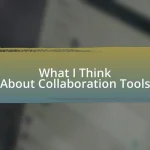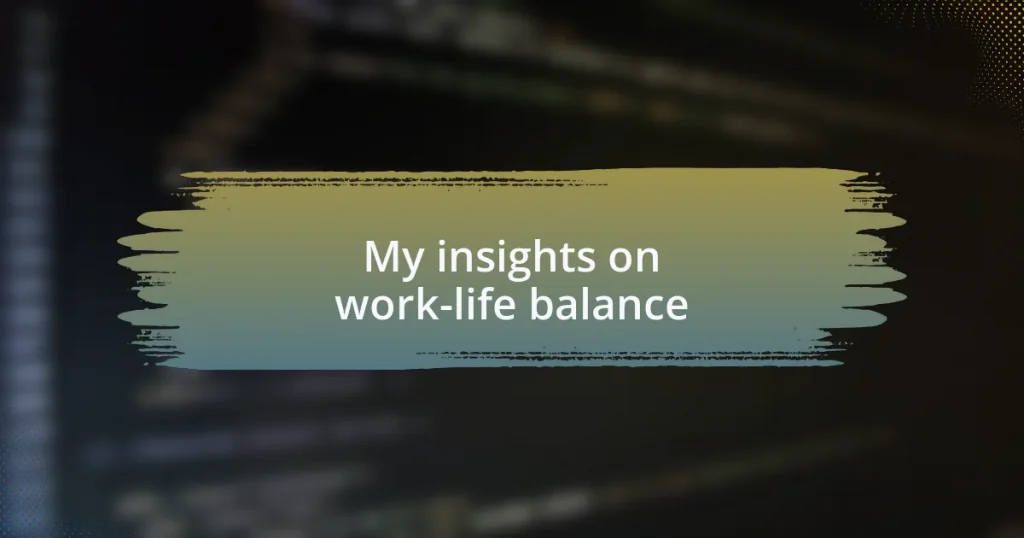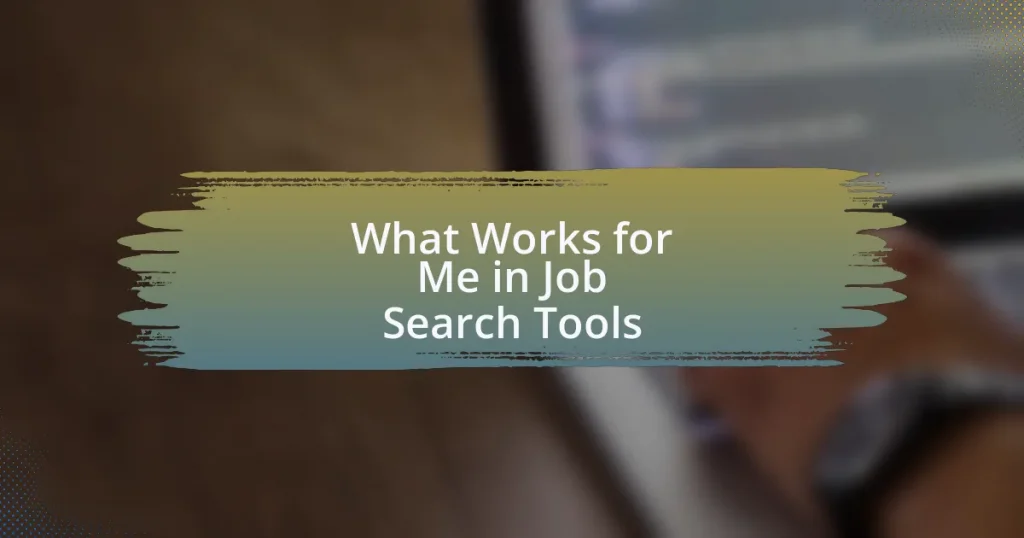Key takeaways:
- Work-life balance requires setting boundaries to prioritize both professional responsibilities and personal time.
- Maintaining this balance enhances individual well-being, creativity, and team collaboration in the tech industry.
- Implementing strategies like using calendar blockers, taking breaks, and learning to say “no” can lead to a healthier work-life integration.
- Regular self-reflection can help adjust commitments and ensure that personal needs are met, promoting long-term sustainability.
Author: Charlotte Everly
Bio: Charlotte Everly is an accomplished author known for her evocative storytelling and richly drawn characters. With a background in literature and creative writing, she weaves tales that explore the complexities of human relationships and the beauty of everyday life. Charlotte’s debut novel was met with critical acclaim, earning her a dedicated readership and multiple awards. When she isn’t penning her next bestseller, she enjoys hiking in the mountains and sipping coffee at her local café. She resides in Seattle with her two rescue dogs, Bella and Max.
Understanding work-life balance
Work-life balance is fundamentally about managing our professional responsibilities while also nurturing our personal lives. I’ve experienced the struggle of being overwhelmed by project deadlines, often sacrificing my personal time. It led me to wonder: how does one truly find equilibrium in a world that constantly demands more from us?
In my journey, I realized that setting boundaries is crucial. There was a time I took on extra work, thinking it would advance my career, only to find myself burnt out and disconnected from my family. I learned to ask myself—what are my priorities? This reflection helped me carve out intentional time for both work and personal activities.
Understanding work-life balance also involves recognizing that it’s not a one-size-fits-all situation. Some days, I feel energized and productive, while others, I need a break to recharge. I often ask my peers: What works for you? Sharing these insights has not only strengthened my connections but has also offered me fresh perspectives on maintaining harmony in life.
Importance of work-life balance
Finding a healthy work-life balance is pivotal for personal well-being, especially in the fast-paced web development field. I recall a time when I was buried under lines of code and deadlines, feeling the stress seep into my weekends. It made me question: how productive can I truly be when my mind is constantly racing? The answer lay in realizing that quality time away from work can actually enhance creativity and problem-solving skills.
Moreover, striking this balance fosters not just individual health, but also strengthens team dynamics. I’ve noticed that when colleagues respect each other’s personal time, it boosts morale and collaboration. It’s fascinating how an environment that encourages balance can lead to innovative projects because everyone comes in refreshed and ready to contribute.
However, many of us overlook that work-life balance is essential for long-term career growth. There was a period where I pushed myself relentlessly, believing that hard work equates to success. But what I learned is that sustainability matters more. After all, isn’t it ironic how working harder without breaks can impede our overall progress? Recognizing the importance of balance can pave the way for not only personal satisfaction but also professional achievements.
Challenges in achieving balance
It’s easy to underestimate how demanding the tech industry can be on our personal lives. I remember a project where the timeline was so tight that I found myself working late into the night, which quickly drained my energy and enthusiasm. Have you ever been in such a situation? It made me realize that the pursuit of excellence can often overshadow the need for self-care, leaving little room for reflection or relaxation.
Another challenge is the pervasive culture of being constantly “on.” In web development, it sometimes feels like there’s an unwritten expectation to respond to messages and emails at all hours. It can be daunting—wondering if you’re letting your team down if you take time for yourself. I’ve found that setting boundaries is vital, but it takes a conscious effort to disconnect and prioritize my own time without feeling guilty.
Additionally, the rapid pace of technology change poses another hurdle. With the pressure to stay current, spending late nights learning new tools can zap the joy out of the creative process. I often question how much knowledge is truly beneficial versus overwhelming. Balancing the desire for professional growth with the need for downtime is undeniably tricky, but I believe navigating this balance is where true career fulfillment lies.
Benefits for web developers
When web developers prioritize work-life balance, they unlock a newfound creativity that can transform their projects. I noticed this shift firsthand when I started setting aside time for hobbies unrelated to coding. After a weekend of unplugging, I returned to my projects with fresh perspectives and innovative ideas that would have otherwise gone unnoticed. Don’t you think a well-rested mind is crucial for creative problem-solving?
Another significant benefit is the potential for lower stress levels. I remember when I used to feel overwhelmed by tight deadlines, and the constant pressure often clouded my judgment. However, implementing a structured schedule helped me manage my time more effectively, reducing anxiety. It’s rewarding to realize that a little organization can lead to both increased productivity and improved mental health.
Furthermore, a balanced lifestyle fosters stronger collaboration within development teams. I’ve often found that when I take care of my own well-being, I’m more present and supportive of my colleagues. This not only enhances communication but also builds a sense of camaraderie. Have you experienced the positive ripple effects of a well-rounded work life on team dynamics?
Strategies for better balance
One effective strategy I’ve found is setting clear boundaries between work and personal time. For instance, I use tools like calendar blockers to color-code my work hours and leisure activities. When I see that vibrant block of personal time, it serves as a reminder to disconnect, allowing me to fully engage in activities that recharge my energy. Have you ever noticed how simply visualizing your time can create a healthier mindset?
Another approach is to build small breaks into my workday. I’ve learned that taking just ten minutes to step away from my screen can do wonders. During those moments, I might take a walk or stretch—activities that refresh my mind and body. Often, I return to my tasks with focus and clarity. Isn’t it interesting how a few minutes can make such a difference in your productivity?
Lastly, I’ve embraced the power of saying “no” more often. At first, it was challenging to turn down additional projects or social gatherings. However, I realized that protecting my time allowed me to dive deeper into my passions and personal projects. By prioritizing what truly matters, I’ve carved out space for both work and rest in a way that feels fulfilling. Have you ever experienced the liberating feeling of focusing on what aligns with your values?
Personal experiences with balance
I recall a particularly hectic phase in my career when deadlines loomed like dark clouds overhead. I found myself working late into the night, often skipping meals, and it didn’t take long before my health started to suffer. That experience taught me that balance isn’t just about dividing my time; it’s about honoring my well-being. Have you ever pushed yourself to the brink only to realize the importance of listening to your body?
There was a time when I would begrudgingly attend every team meeting, believing that my presence was crucial for my team’s success. However, I soon discovered that by stepping back occasionally, I could gain a fresh perspective. Instead of feeling tethered, I learned to value quality over quantity in my contributions. It’s remarkable how a little distance can yield clarity. Have you ever experienced a shift in your perspective after taking a step back?
A more recent shift in my approach involved intentionally scheduling “me time” without guilt. I began setting aside evenings for hobbies that spark joy—like painting or cooking. The act of creating something with my hands not only replenished my energy but also sparked newfound creativity in my work. Isn’t it fascinating how nurturing your inner self can enrich both your personal and professional life?
Tips for sustainable work-life balance
Finding a sustainable work-life balance starts with setting clear boundaries. I remember feeling overwhelmed by constant notifications from work emails even after hours. I decided to mute notifications in the evenings, and it was a game-changer. How liberating is it to truly disconnect from work and focus on what matters at home?
Incorporating small but meaningful rituals into my daily routine has also made a significant impact. For instance, I began my mornings with a short meditation, which helps me ground myself and set a positive tone for the day. This practice fostered a mindfulness that spills over into my work, allowing me to navigate challenges with a clearer mind. Have you ever noticed how a calm start can transform your entire day?
Lastly, I’ve learned the value of regular check-ins with myself. I set aside time each week to reflect on my workload and mental health. During these moments, I ask, “Am I honoring my needs?” This simple question has led me to adjust my commitments, ensuring I don’t overextend myself. What would your week look like if you prioritized this kind of self-reflection?















